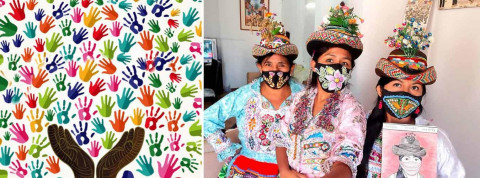
photo: ©UNESCO Almaty/Venuca Evanan, Violeta Quispe and Gaudencia Yupari
Held every year on 21 May, UNESCO leads the celebration of World Day for Cultural Diversity for Dialogue and Development highlighting not only the richness of the world’s cultures, but also the essential role of intercultural dialogue for achieving peace and sustainable development.
The pandemic has proven the intrinsic value of the cultural and creative sector at generating social cohesion, educational resource or personal well-being in times of crisis. It has also undermined the sector’s potential to generate economic growth, something which is too often underestimated. The cultural sector accounts for 3.1% of global GDP and 6.2% of all employment.
Culture and Sustainable Development
With the adoption in September 2015 of the 2030 Agenda for Sustainable Development by the United Nations, and the resolution on Culture and Sustainable Development adopted by the UN General Assembly in December 2015 , the message of the World Day for Cultural Diversity for Dialogue and Development is more important than ever. The 17 Sustainable Development Goals (SDGs) can best be achieved by drawing upon the creative potential of the world’s diverse cultures and engaging in continuous dialogue to ensure that all members of society benefit from sustainable development.
Why does cultural diversity matter?
Three-quarters of the world’s major conflicts have a cultural dimension. Bridging the gap between cultures is urgent and necessary for peace, stability and development.
Cultural diversity is a driving force of development, not only with respect to economic growth, but also as a means of leading a more fulfilling intellectual, emotional, moral and spiritual life. This is captured in the culture conventions, which provide a solid basis for the promotion of cultural diversity. Cultural diversity is thus an asset that is indispensable for poverty reduction and the achievement of sustainable development.
At the same time, acceptance and recognition of cultural diversity – in particular through innovative use of media and Information and Communications Technologies (ICTs) – are conducive to dialogue among civilizations and cultures, respect and mutual understanding.